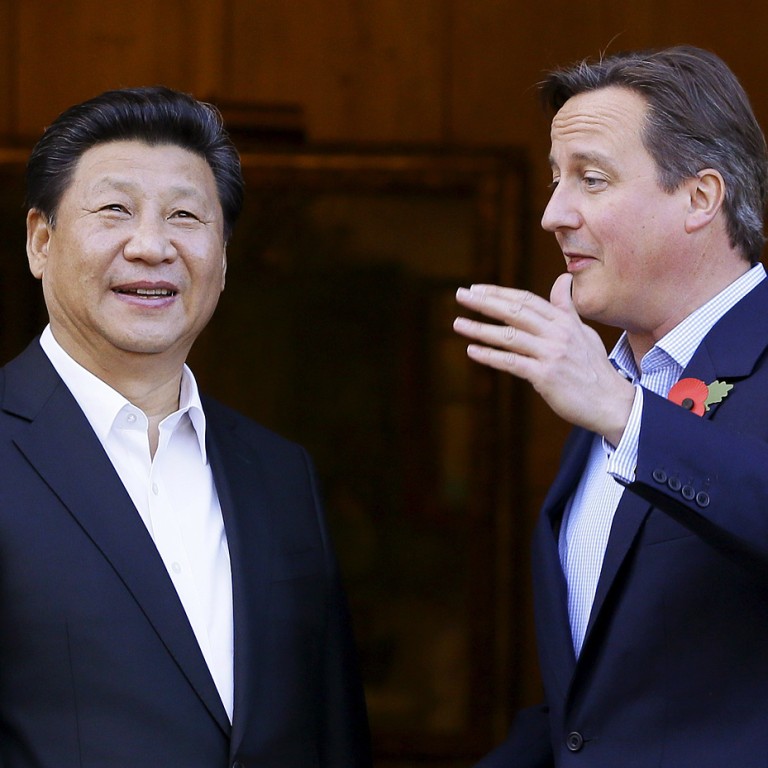
Update | ‘Let Hong Kong elect its own leader’: Britain’s David Cameron asks Xi Jinping to ensure city’s political freedom
British Prime Minister David Cameron has sought assurance from President Xi Jinping, who is on a state visit to UK, that Hongkongers would be able to choose their own leader without Beijing’s prior vetting, according to a report.
British Prime Minister David Cameron has sought assurance from President Xi Jinping, who is on a state visit to UK, that Hongkongers would be able to choose their own leader without Beijing’s prior vetting, according to a report.
Cameron touched on the political stalemate in Hong Kong for the first time during Xi’s visit amid mounting criticism Britain had ignored China’s human rights record for trade benefits, reported.
Chief Executive Leung Chun-ying has previously said his administration “has finished” the work on reform and would concentrate on addressing economic and livelihood issues in his remaining term.
READ MORE: Xi Jinping, UK prime minister discuss foreign policy after pint and fish and chips down the pub
Spending the afternoon at the prime minister’s country retreat, Chequers, on Thursday, reported that Cameron sought assurance from Xi that Hong Kong would remain semi-autonomous and entitled to choose its own leadership without prior vetting by the Chinese government.
Without confirming the media report, Foreign Ministry spokeswoman Hua Chunying reiterated that Beijing would support Hong Kong in implementing universal suffrage in accordance with the Basic Law, adding that the matter was China's internal affair. But Cameron's remarks failed to impress the city's pan-democrats.
"He seems to be acting in response to media pressure from Britain and Hong Kong on his country's moral obligation to the former colony, but his wording is disappointing," said Civic Party lawmaker Dr Kenneth Chan Ka-lok, an international relations scholar at Hong Kong Baptist University.
"While he deserves credit for asking Xi not to vet Hong Kong's chief executive candidates, this came too little, too late."
Democratic Party chairwoman Emily Lau Wai-hing said it was "not enough" for Cameron to raise concerns over the city's political freedom to Xi in a closed-door meeting.
"He should have raised it at a higher level occasion, such as a press conference or other public events," Lau said. "As a signatory to the [Sino-British] Joint Declaration, Britain has the political and moral responsibility to voice out for Hong Kong ... not raising the matter publicly has given people an impression the city a low priority for Britain."
READ MORE: All you need to know about Xi Jinping's UK state visit
Lau said Beijing's earlier white paper on "one country, two systems" and recent remarks by state officials were all very worrying, and she hoped Cameron was not just paying lip service but would continue to speak up for Hong Kong on other occasions, not just Xi's state visit.
Lau also held reservations on Cameron's quoted remarks that the city should remain "semi-autonomous".
"It has always been 'a high degree of autonomy' [as in the joint declaration]. I hope Cameron would not mix that up and send a wrong signal to Chinese officials," she added.
In its six-monthly parliamentary report on Hong Kong published in July, the British government backed pan-democrats’ calls for the government to restart electoral reform to achieve universal suffrage, saying it was imperative for the “effective functioning of, and confidence in” the “one country, two systems” guaranteed by Beijing.
The British government had urged Hong Kong lawmakers to study the political reform proposals, with Foreign Office minister Hugo Swire saying in March that Beijing’s imperfect plan represented genuine improvement as “something is better than nothing”.
Executive and legislative councillor Starry Lee Wai-king, chairwoman of the Democratic Alliance for the Betterment and Progress of Hong Kong, said Cameron's remarks were unlikely to speed up the process of constitutional reform as this could not be handled by the present administration.


